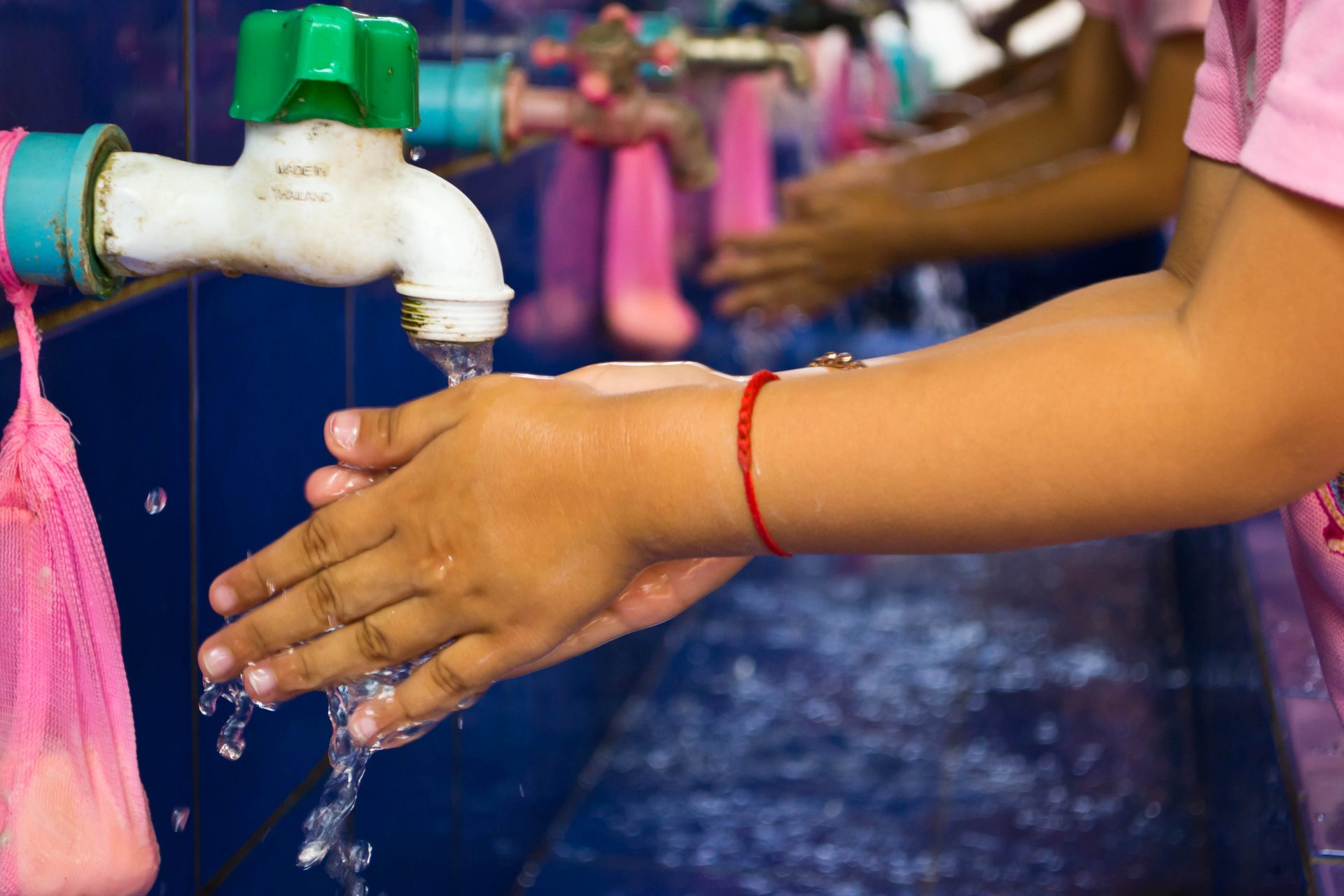- SIWI – Leading expert in water governance
- /
- Latest
- /
- Peer-to-peer learning on new emerging issues in WASH: Climate Change and WASH in Schools
Peer-to-peer learning on new emerging issues in WASH: Climate Change and WASH in Schools

In partnership with UNICEF Latin American and the Caribbean Regional Office (LACRO), SIWI facilitated a peer-to-peer learning exercise for national counterparts and UNICEF staff on emerging issues relevant for the development of the WASH sector, specifically the integration of the climate change risks into programming and WASH in schools.
In December 2021, SIWI WASH experts facilitated a peer-to-peer learning exercise on emerging issues in the WASH Sector. The course was composed by three training sessions and counted on the presence of presenters from the UNICEF Climate, Energy, Environment and Risk Reduction team, the education specialists from two regional offices: Latin America and the Caribbean and the Middle East and North Africa ones.
The three sessions focused on emerging issues for the WASH sector. The topics which were selected were: 1) integration of climate change risks into WASH programming (session 1); 2) how to ensure a safe back-to-school, especially in the context of the pandemic (sessions 2 and 3).
Over 60 participants from 19 countries in Latin America took part in the different sessions. The participants were mainly from UNICEF Country Offices in LAC and Africa, partners from different organizations in the sector such as sectoral ministries, other UN agencies, non-governmental organizations.
The first session started by a presentation by Hanoch Barlevi (UNICEF expert for the Climate, Energy and Environment Disaster Risk Reduction (CEED) team, where he explained the main context and shared UNICEF CEED work so far and how it can support work for country offices. In a second and third presentation, Robin Ward and Virginia Mariezcurrena SIWI´s Program Managers in the Water and Sanitation team presented the list of services that SIWI provides for climate change and WASH, and shared practical cases and experiences from Brazil and Angola. The session finalized with the WASH Specialist for UNICEF Bolivia, Irma Peredo, presenting their experience on the Risk – Informed WASH BAT.
The second session started with a presentation by Prakash Rej Lamsal, WASH manager based in UNICEF Pakistan, who shared their experience in supporting the government for a safe reopening of schools, together with a case study of a costing tool developed for identifying the effort level needed for levelling up WASH services in some schools in the country. Then, Alban Nouvellon, the Regional WASH advisor for UNICEF Latin American and the Caribbean Regional Office (LACRO), gave an overview of LAC regional challenges for intervening in WASH in Schools, where there are clear indications of the need of an important effort to improve WASH access in the regional schools, especially in the context of the pandemic. After him, SIWI’s Manal Schraideh, SIWI´s Program Officer in the Water and Sanitation team shared the experience of developing a multi-country theory of change for WASH interventions in schools in the Middle East and Northern African region. Finally, Carolina Carias from UNICEF Honduras, shared their experience on how they strengthened the school and education communities for working towards Climate Resilient WASH services in Schools. They worked towards building capacities in staff and students, specially developing and using low-cost innovative local solutions (like tip taps for water provision, reusable sanitary pads and soap made out of local materials). The session finished by an exercise where countries would identify the challenges that the sectors is facing in the schools’ sphere.
The third session started by a presentation by Eduardo Hernández, WASH specialist from UNICEF Mexico. Hernandez shared the preparation and methodology for the climatic and environmental risk assessment leading to a Risk Informed WASHBAT in Schools in Mexico. For integrating these risks into the WASH BAT in schools the evaluation criteria were adjusted to the Mexican context (in areas such as indigenous peoples´ cosmovision, language, and expected behaviour, for example). Then, in a participatory process, they assessed hazards, expositions, and vulnerabilities. As a result, the top 20 aggregated risks were identified, which were used to develop 20 additional criteria, just drafted for the results of the risk assessment.
Following this presentation, Ana Margarita Ramos, WASH specialist from UNICEF Paraguay shared the experience of the collaboration between the Ministry of Education, UNICEF and SIWI to organize a baseline study about the WASH services in the schools in Paraguay. She explained that a total of 2207 schools were mapped with georeferenced information on the status of their WASH infrastructure, which represents 28% of schools in the country. All subnational governments (departments) in Paraguay were represented in the sample. Ana stated that the results of the database study were worrying, it showed that 77% of schools do not have adequate sanitation infrastructure, and almost no school has adequate menstrual hygiene facilities.
Finally, Daisy Velazquez, from UNICEF Venezuela shared their experience using the three-star approach for evaluating the status of WASH infrastructure at schools. Daisy stated that nowadays, 82% of Venezuelan population has unreliable or no access to water, while 87% of the population had access to water 20 years ago. This remarkable deterioration of WASH services access has a massive impact in schools. UNICEF Venezuela implemented the three-star approach with 14 partner organizations in 300 schools. The approach is a methodology to evaluate the accessibility, quality, and availability of WASH services at schools. The first phase was about developing capacities amongst intervening partners, planning for behavioural change, (re) defining the standards together with the WASH cluster. The approach is seen as part of the humanitarian – development nexus. For the second phase, the plan is to scale up the approach to at least 500 school facilities.
The last part of the session consisted in group exercises, based upon the challenges previously identified in in each country. The attendees were invited to use a collaborative board in MIRO where the theory of change was presented, and outcomes were shared with participants. In this exercise, each country provided different actions that needed to take place to achieve safe and sustainable WASH services in schools, based on the case studies showed in the sessions allocated to WASH in Schools.
This peer-to-peer exercise helped UNICEF LACRO to strengthen the network of WASH professionals working in the region. The experiences and good practices shared by UNICEF staff to their peers facing resulted in strengthening the knowledge of the overall network of professionals in LAC. In addition, it dentified them as a reference for certain topic by their peers, Overall, the peer-to-peer learning exercise was highly appreciated by the participants; they expressed that it broadened their perspectives on WASH interventions, both linked to the climate change and environmental risks, and in school settings.
What is WASH BAT?
WASH BAT is a methodology used to diagnose the bottlenecks that the WASH sector has in certain context. The Risk informed version of it, looks into the climate change and environmental risks that could affect the sector’s performance through a risk assessment process undertaken way before the WASHBAT as such. The results of the risk assessment inform the diagnostic in several ways. For more information, please consult the WASH BAT resource page.
Most recent

SIWI Amman and UNICEF host Libya representatives for WASH exposure visit
- Water, Sanitation and Hygiene (WASH)
- Water governance

Water and land: Partners in climate mitigation
- Water in landscapes
- Wetlands
- Water governance

What is the role of water in rural and urban school facilities?
- Water, Sanitation and Hygiene (WASH)
- Water in landscapes
- Water governance
- Gender and water

Taking root: locally driven forest landscape restoration
- Water in landscapes
- Wetlands
- Groundwater
- Resilience through water

SIWI Amman hosts Ghana representatives for WASH exposure visit in Jordan

Join us on a journey through 2023

Peace starts with WASH: 8 steps toward stronger governance

